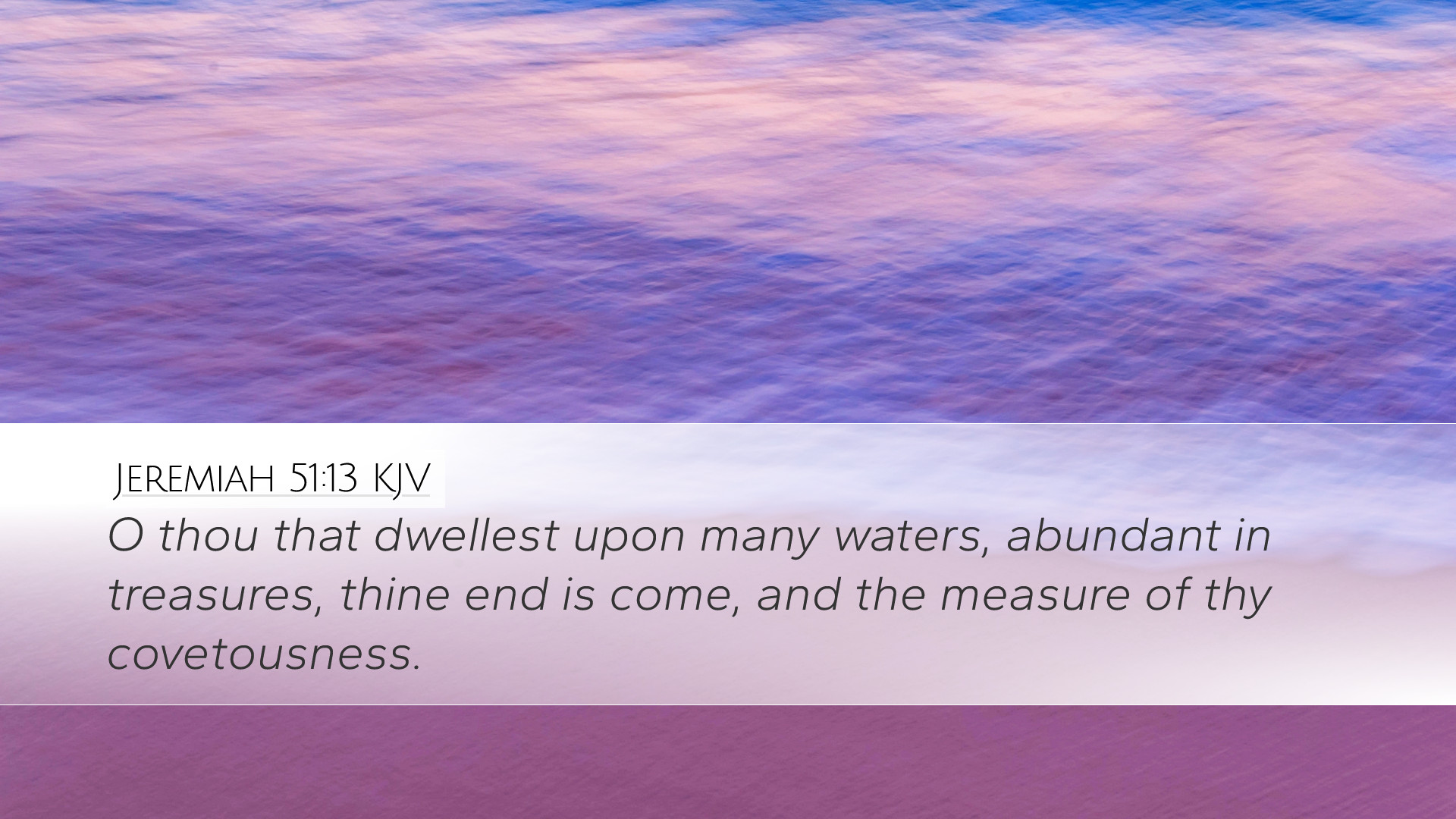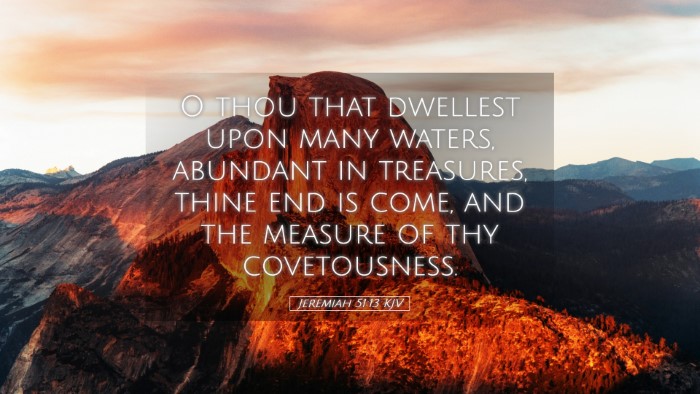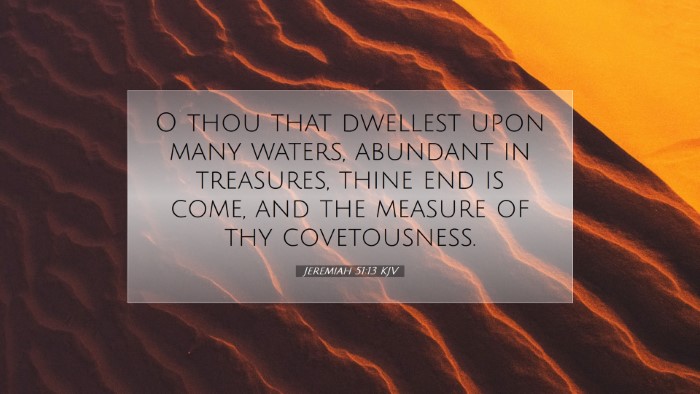Commentary on Jeremiah 51:13
Verse: "O thou that dwellest upon many waters, abundant in treasures, thine end is come, and the measure of thy covetousness." (Jeremiah 51:13)
Introduction
This verse occurs in the midst of prophetic judgment against Babylon, a nation known for its wealth and idolatry. The rich imagery of "many waters" and "abundant treasures" captures the essence of Babylon's extravagant and opulent lifestyle. The commentaries from Matthew Henry, Albert Barnes, and Adam Clarke provide a multi-faceted understanding of God's judgment upon this great city, offering valuable insights for pastors, theologians, and students of Scripture.
Contextual Analysis
In the book of Jeremiah, we find a recurring theme of judgment against nations, particularly Babylon, which embodied the defiance against God. Jeremiah 51 details the prophetic proclamation of the fall of Babylon, likened to a divine decree that covers the relentless oppression, idolatrous practices, and significant sins of the people. This verse captures the precipice of judgment, bringing clarity to the nature of Babylon's sins.
Insights from Matthew Henry
Matthew Henry emphasizes the description of Babylon as one who "dwells upon many waters," signifying not only its geographical placement but also its cultivation of many pleasures and indulgences. Henry notes that the vast waters symbolize the wealth that flowed into Babylon from various nations due to trade and conquest. According to Henry, this opulence led to abundance in treasures, fostering pride and ultimately inviting God's judgment.
He reflects on the phrase "thine end is come," highlighting a profound truth concerning divine justice—the inevitable fall of the proud. God’s patience has limits, and when sin reaches a full measure, judgment comes. Henry portrays this verse as an urgent warning about the dangers of materialism and self-sufficiency, urging readers to recognize that reliance on riches leads to spiritual downfall.
Insights from Albert Barnes
Albert Barnes elaborates on the metaphor of abundance, suggesting that Babylon's riches did not shield her from the impending doom. Barnes notes that "abundant in treasures" hints at wealth obtained through means that were not always just. He argues that wealth cannot prevent divine judgment, and a nation can be as fruitful as it wants, but if its ways are contrary to God, it faces a reckoning.
Furthermore, Barnes emphasizes the usage of the term “covetousness” to demonstrate the root cause of Babylon’s troubles. Covetousness not only characterizes the materialistic pursuits but also represents the heart's discontentment. Babylon's fixation on acquiring more led to grievances against God’s design. In essence, Barnes encourages readers to see the futility of pursuing belongings at the expense of spiritual integrity.
Insights from Adam Clarke
Adam Clarke offers a valuable examination of the societal implications of the verse. He aligns "many waters" with the prosperity that comes from sinning against God. Clarke articulates that this prosperity may be desirable in the eyes of man but is a snare that leads to destruction. He notes that Babylon's splendor was laden with iniquity, and while the city appeared powerful, it was merely a façade of strength masking profound spiritual bankruptcy.
Clarke also warns that the "measure of thy covetousness" indicates God's perfect timing in executing judgment. He connects this to the broader theological theme of divine justice, where God's justice eventually prevails over human arrogance. Clarke exhorts readers to examine their own hearts in relation to material wealth, advocating for transparency and moral integrity in the quest for prosperity.
Theological Reflections
Collectively, the insights from these esteemed commentators establish a crucial framework for understanding Jeremiah 51:13. The themes of judgment, the futility of earthly wealth, and the dangers of covetousness resonate deeply in contemporary society. Pastors and theologians can convey the message that the desire for riches must not overshadow the pursuit of righteousness.
Furthermore, this passage challenges believers to introspect on their own "many waters"—the sources of wealth and abundance in their lives—and consider whether these become idols that distract from devotion to God. The analogy of Babylon serves as a reminder that earthly powers, no matter how mighty, are still subject to God’s sovereign plan.
Practical Applications
- Wealth and Responsibility: Believers are encouraged to view wealth as a stewardship rather than an end. Resources entrusted to us should encourage generosity and compassion rather than greed.
- Assessing Priorities: Individuals are called to evaluate their lifestyles to ensure that they prioritize godliness over materialism. Recognizing the fleeting nature of worldly riches can recalibrate our goals.
- Understanding Divine Justice: Emphasizing God’s justice assures us that no deed goes unnoticed. Pastors can preach with a conviction that while humanity may overlook wrongdoings, God will not.
- Community Reflection: Congregations can engage in discussions that emphasize accountability in their communal and individual pursuits of wealth.
Conclusion
Jeremiah 51:13 serves as a potent reminder of God’s disdain for greed and the eventual tumbling of those who place their hope in earthly riches. The collective wisdom from Matthew Henry, Albert Barnes, and Adam Clarke brings depth to our understanding of this verse, allowing us to grasp both its historical context and its enduring relevance. For pastors and theologians, these insights present opportunities for deep theological exploration and impactful preaching, challenging congregations to align their hearts with the values of God's kingdom.


